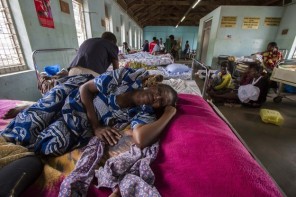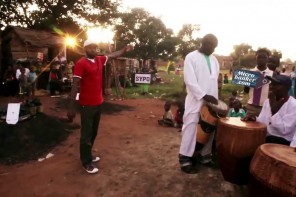Ugandan radio journalist Arafat Nzito disappeared last week, and human rights observers in Uganda think he is being held by the country’s Joint Anti-Terrorism Task Force, a security arm of the Ugandan government.
Nzito, 23, had been working for two months with Radio Simba, a popular FM station known for its political talk shows before those were banned. He left his office for what he thought was a brief meeting with people repeatedly calling him and asking him to meet them in a nearby parking lot; he never returned.
“He was in the newsroom working on a story, so he requested his colleagues, ‘Please don’t tamper with my piece, let me attend to these people, I’ll come back and finish my work,'” said Geoffrey Wokulira Ssebaggala, research director and program coordinator of Human Rights Network for Journalists-Uganda (HRNJ), in a telephone interview.
Instead, Nzito was driven away in a “Toyota double cabin” with tinted windows; four other men were sitting inside, according to witnesses who talked to HRNJ. The men he met with, and between whom he was sandwiched in the car, were dressed in plain clothes.
Ssebaggala told me neither HRNJ, which is investigating the matter, nor Radio Simba knew who the men were or what they were calling about. Radio Simba staff tried reaching Nzito by phone, but he didn’t answer. They began to worry the next day; Nzito didn’t turn up for an editorial meeting, and his sister phoned the station to say she hadn’t seen Nzito for two days.
The motive for the possible kidnapping is unclear. Nzito is a crime reporter with the station who also occasionally covers the country’s opposition party, Ssebaggala said. Nzito’s bosses insisted to Ssebaggala that the cub reporter’s political coverage was fact-based and fair.
HRNJ investigated the disappearance by looking for Nzito in police offices around Kamapala. When that turned nothing up, a delegation from the group met with the head of the Chieftaincy of Military Intelligence (CMI), another security agency. CMI insisted it knew nothing about the disappearance and would investigate, according to Ssebaggala, who was at the meeting.
HRNJ later received reports that Nzito is being held by the Joint Anti-Terrorism Task Force, another security agency. Ssebaggala says he tried to confirm this with CMI, where his contacts were unavailable.
Security agencies in Uganda proliferate; says one Ugandan journalist, “the line between the two” — the terrorism task force and the CMI — “is very thin.”
HRNJ will file papers at the High Court in Kampala tomorrow, compelling the task force to bring Nzito to court and either charge him or free him unconditionally. That can take up to two weeks, Ssebaggala says, though urgent cases are usually prioritized.
Update: My friend Allan Brian Ssenyonga points out that well-known journalist Kalundi Serumaga was arrested in similar fashion last year, after making some controversial political statements on a radio station. He was eventually released — Ssenyonga thinks his Irish passport helped. His father, a famous playwright named Robert Serumaga, was also arrested for being on the wrong side of power — in Serumaga senior’s case, that power was Idi Amin, and Serumaga was never seen again.




There are a few inaccuracies in this story. First, Kalundi Sr was never abducted by Amin. He fled to Ireland and was followed there by the rest of his family. He died many years later from other causes.
Needless to say, that’s how Kalundi Serumaga got his Irish passport. Secondly, you make Mr. Nzito sound like a big name political show host yet he was an intern two years out of school who was yet to even secure his position permanently.
Now, Jina, you might have heard about the recent waves of arrests of journalists who attempted to extort money from public officials. You see, journalists here in Uganda are not saints like you western journalists. Maybe, just maybe, there is a side to him that the public knows not. Maybe he was abducted by non-state criminal elements.
But again, this is Africa. Journalists are supposed to be jailed, beaten and murdered for their work. Anything short of that would not make interesting reading for your largely western audience. In fact, I would take them for a ride myself if i were you. So go for it girl.
I observed you were careful about what you wrote about Rwanda. Jina, maybe you should try filing reports like these about Rwanda where you are based, just to see what happens when armchair journalism runs afoul of a state that pays particular attention to what is being written about it.
I appreciate the biting sarcasm, but a few points are in order:
1. I know, via the venerable African literary magazine Kwani, Kalundi to have been arrested at least once under the Amin. I understand from Kwani that Kalundi was murdered in 1980. This information is corroborated in other reputable sources; you’re welcome to your own opinion.
2. I state in this piece that Nzito had been working for only two months at the station. I was told by HRNJ that he is a crime reporter who occasionally covers political opposition. I do not believe I made him “sound like a big name political show host.”
3. I have indeed heard about that recent wave of arrests. You are free to speculate about who you believe arrested Nzito; I relied for that information on HRNJ, who is in touch with various Ugandan authorities on the matter.
4. I vehemently disagree with your assessment that African journalists should be jailed, beaten and murdered, even if it was sarcastic. I disbelieve your implication that the governments and/or private entities who persecute journalists in this fashion do so so that “western audience[s]” will have something to read; in fact I believe that such institutions have far more to gain from suppressing information domestically than from “entertaining” (to adopt your approach) global readers. It is probably also worth pointing out that these reports discredit governments in the eyes of many worldwide, as the many indices that track press and political freedom will attest.
Finally, I resent your disrespect for my African colleagues across the continent who work under difficult and dangerous circumstances.
5. I’ve written about journalism in Rwanda on this blog before. My own view is that the situation is not as dire as some have made it out to be — and indeed, very much unlike what’s been reported about Uganda lately.
Now, isn’t it an unwritten rule that information taken from a blog or activists’ site should be taken with a pinch of salt? Someone like you should double check their information, at least when doubts have been raised about it. Anyway, that’s your prerogative.
But for the record, Kalundi Serumaga Sr fled Uganda for Kenya where he lived till the overthrow of Idi Amin(April 1979). He was actually made a minister in the liberating coalition government. He died in September 1980 in Nairobi. you might want to check out this more ‘reputable’ link:
http://www.monitor.co.ug/OpEd/OpEdColumnists/CharlesOnyangoObbo/-/878504/719354/-/wtjrsg/-/index.html
The bottom line in what am saying is this: Uganda, or Africa for that matter, has issues of crime, poverty, lawlessness, poor state institutions bedeviling our society. Journalists do not operate in isolation, they are part and parcel of this society. All of us are affected.
Dickson Sentongo was a victim of iron bar robbers (crime) while Kigundu was killed because the riders did not want their pictures published for taking part in mob justice (concealment of crime). Many Ugandans have lost their lives this way. This is a big problem of lawlessness and poverty which shouldn’t be reduced to a story about an attack against the media just because two journalists fell victim.
Granted, the tycoon mentioned in that other post got away with punching two journalists. But I also know many celebrities in the west who have been as ‘lucky’.
Media activists run the risk of being ignored if they continue to trivialize wider social problems for their own purposes. Period
Kwani isn’t an advocacy organization. It is, as I stated, an African literary magazine, and its managing editor is an investigative journalist of tremendous repute. Perhaps you’re thinking of another organization?
I don’t think there’s anything at odds with what you’re saying — that “crime, poverty, lawlessness and poor state institutions” affect many people — and Nzoti case.
Whatever Kwani is, the information you got from there is inaccurate. I do not know what you mean by ‘tremendous repute’ but my take is that they still remain human, and by extension, prone to err.
And this Nzito guy, no one knows for sure who took him or where he is. Why do you insist he is held by the counter terrorism force? Because this is Africa? Whatever happens to a journalist here, it must be because of his work, right?
Therein lies the problem.
The sheer disrespect is puzzling to me. It borders on outright racism. An obscure journalist is murdered by iron bar-wielding thugs, probably because he passes through an insecure part of town and somehow, it must be the state. After all, isn’t this Idi Amin’s country?
Am so worried about the way people get lost,i some times sit down and ask my self Which
kind of state will our children inherit?its not that we Ugandans are different,not that we dont have human rights bodies,not that we dont have laws.were is the problem?i ask my self.i am training to become a jornalist but i get scared whenever i hear such stories and incidents.During the Elections a many jornalist were injured in the course of their work.they are taken to be rioters and demostrators since many of them have tested the police brutality by shooting and spraying them tear gas.i want to give an advice to the conserned personel that they should not forget that its the constitution that gives jornalists right to information.it does not spacify what they should broadcast and what they should not there for its not right to blame a jornalist to cover a story that is anti government.i have written this because most of the jornalist that have been persecuted belong to the negative side.we should not forget that its not a crime for a jornalist to have a political party.we have seen NRM supporters who are jornalists.have they also dissappeared like Nzito?eg Tnny owana